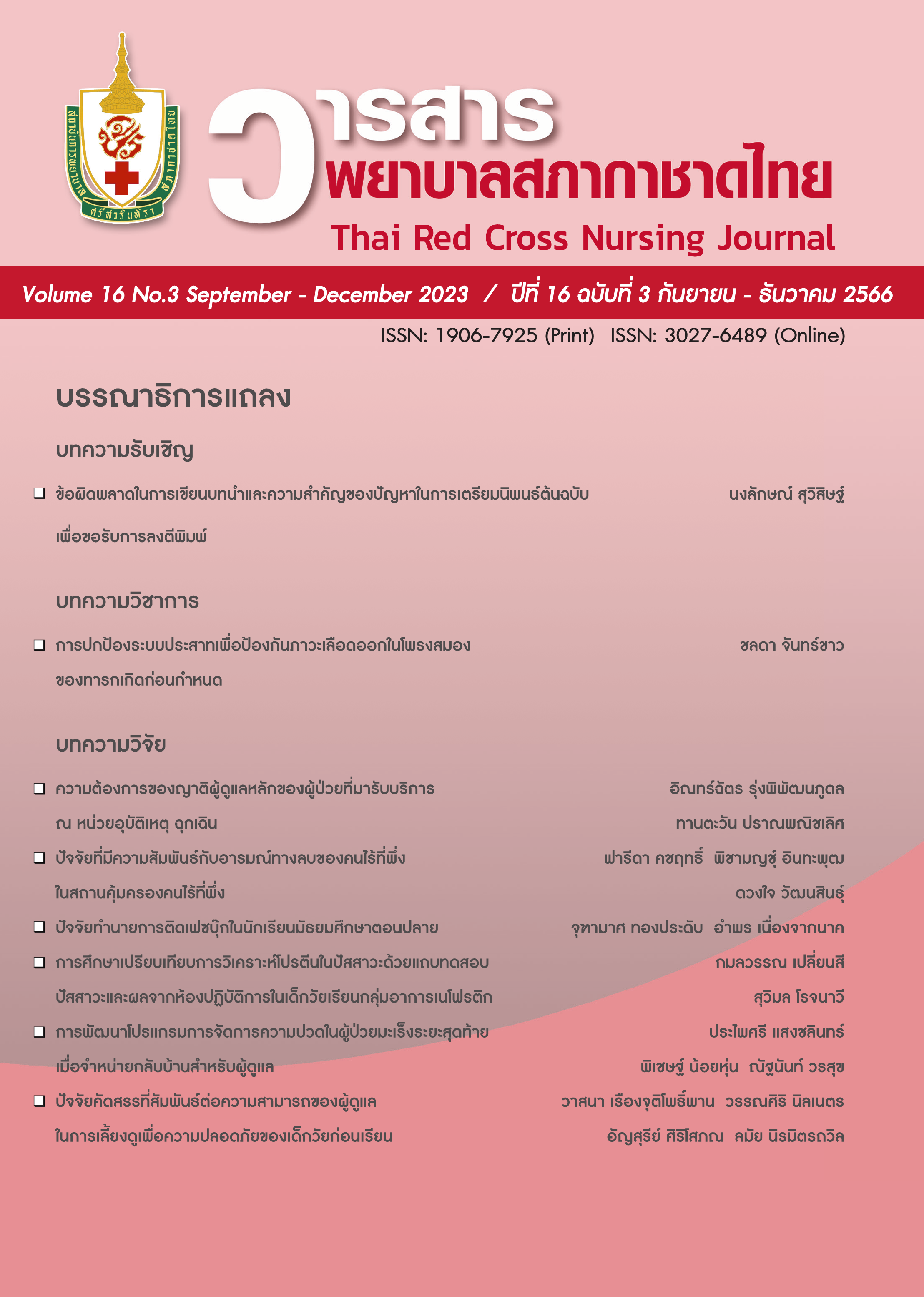The Development of a Pain Management and Discharge Planning Program for Caregivers of Terminally Ill Cancer Patients
Keywords:
family caregivers, terminally ill cancer patients, palliative care, pain managementAbstract
This study aimed to develop a pain management and discharge planning program for caregivers of terminally ill cancer patients and to study the results of implementing this program. The study included two phases: 1) identifying and analyzing problems in order to develop a pain management program for family caregivers of terminally ill cancer patients upon being discharged to the home; this phase included focus group discussions with 12 persons, including doctors, pharmacists, nurses, nutritionists, and occupational therapists; and 2) evaluating both the effect of the program on the knowledge, attitudes, and pain management skills of caregivers as well as the pain levels of terminally ill cancer patients. The study involved the following four steps: 1. Participating in defining the problem and evaluating the situation, 2. Participating in reflection and thinking critically, 3. Choosing the right pain management approach, and 4 Evaluating and maintaining practices. The sample was composed of 35 family caregivers and 35 terminally ill cancer patients, selected via purposive sampling, conducted between July and December, 2023. The measurements of data collection were knowledge, attitude, and pain management skills questionnaires, and a numeric pain scale with a reliability of 0.73, 0.80, 0.76, and 0.87. Data were analyzed using percentages, mean, standard deviation, and paired t-tests. Qualitative data were analyzed using content analysis.
The results showed that:
1st phase: After discussion with the multidisciplinary team, a pain management and discharge planning program for caregivers of terminally ill cancer patients was developed.
2nd phase: 1) After entering the program, the family caregivers had significantly higher mean scores regarding their knowledge, attitudes, and pain management skills than before entering the program (p < 0.01), and 2) terminally ill cancer patients had significantly lower mean pain scores, as both the minimum pain scores and maximum pain scores 24 hours post-training were significantly lower than before training (p < 0.01).
Conclusions: The program developed through this study can be used to increase the capacity of caregivers to manage pain in terminally ill cancer patients upon discharge.
References
World Health Organization. World Health statistic 2018. France: World Health Organization; 2018.
Ministry of Public Health. Strategy and planning division. Nonthaburi: Public Health Statistic; 2021. (in Thai)
Boland E, Boland J, editor. A guide to symptom management in palliative care version 7. England: Yorkshire and Humber Palliative and End of Life Care Group. National Healthcare Service; 2023.
Kreitler S, Beltrutti D, Lamberto A, Niv D. The handbook of chronic pain. New York: Nova Biomedical Books; 2007.
Rungjang S, Numjuntra R. Symptom management in patients with advance lung cancer. Thai Journal of Cardio-Thoracic Nursing 2016;27(2):43-57. (in Thai)
Supaporn K. Caregiver burden and mental health problems among the caregivers of the elderly at home-based palliative stage. Kuakarun Journal of Nursing 2020;27(1):150-61. (in Thai)
Ministry of Public Health, Department of Medical Services. A guide to palliative and end of life care for medical personal. Nonthaburi: The War Veterans Organization of Thailand Under Royal Patronage His Majesty the King; 2020. (in Thai)
World Health Organization. Palliative care. France: World Health Organization; 2022.
Pathumthani Hospital. Report of palliative care A.D.2019-2021. Pathumthani: Pathumthani Hospital; 2021. (in Thai)
Ministry of Public Health. Health Data Center service 2021. Nonthaburi: Ministry of Public Health; 2021. (in Thai)
Strategy and Planning Division, Office of the Permanent Secretary Ministry of Public Health. KPI template ministry of public health A.D. 2022. Nonthaburi: Strategy and Planning Division; 2021. (in Thai)
Gibson CH. The process of empowerment in mother of chronically ill children. J Adv Nurs 1995;21(6):1201-10.
Taumrung J, Somjaivong B. The effects of case management in palliative care program on pain and palliative care outcomes among patients with advanced cancer. Journal of Nursing Science & Health 2021;44(4):55-68. (in Thai)
Thai Mental State Examination: TMSE [Internet]. (n.d.). [cited 2023 Jun 20]. Available from: http://www.rbpho.moph.go.th/upload-file/doc/files/12012023-110743-1739.pdf
Chewaskulyong B, Sapinun L, Downing GM, Intaratat P, Lesperance M, Leautrakul S, et al. Reliability and validity of the Thai translation (Thai PPS Adult Suandok) of the Palliative Performance Scale (PPSv2). Palliat Med 2012;26(8):1034-41.
Ferraz MB, Quaresma MR, Aquino LR, Atra E, Tugwell P, Goldsmith CH. Reliability of pain scales in the assessment of literate and illiterate patients with rheumatoid arthritis. J Rheumatol 1990;17(8):1022–4.
Thippayachan C. The adaptation of family caregivers with end of life care male inpatient Selaphum hospital, Roi Et Province. Academic Journal of Nursing and Health Science 2023;3(1):17-30. (in Thai)
Panthong P, Phatisena T. The empowerment of caregivers for rehabilitation of stroke patients at Maharat Nakhon Ratchasima hospital. DPC 9 J 2018;24(2):57-66. (in Thai)
Phiangsaegiam W, Chaisang P, Phongsuphasa, Jumjana S. The development of caregiver’s empowerment program of bed bound elderly in community. Nursing Public Health and Education Journal 2017;18(3):83-95. (in Thai)
Semsarn S, Chaiviboontham S, Chansriwong P. Effects of family caregiver training program on family caregivers and patients outcomes in terminal care of chronic illness patients. Thai Journal of Nursing and Midwifery Practice 2018;5(1):112-26. (in Thai)
Pijomboot A, Awipan R. Niamhum N. Development and evaluation of pain management program by relatives who were caregivers of terminally III cancer patients. TJPP 2023;15(1):73-83. (in Thai)
Downloads
Published
Issue
Section
License
Copyright (c) 2024 Srisavarindhira Thai Red Cross Institute of Nursing

This work is licensed under a Creative Commons Attribution-NonCommercial-NoDerivatives 4.0 International License.
เนื้อหาบทความหรือข้อคิดเห็นต่างๆ ในวารสารพยาบาลสภากาชาดไทยนี้ เป็นความคิดเห็นของผู้เขียนบทความ ไม่ใช่ความเห็นของกองบรรณาธิการ หรือสถาบันการพยาบาลศรีสวรินทิรา สภากาชาดไทย






